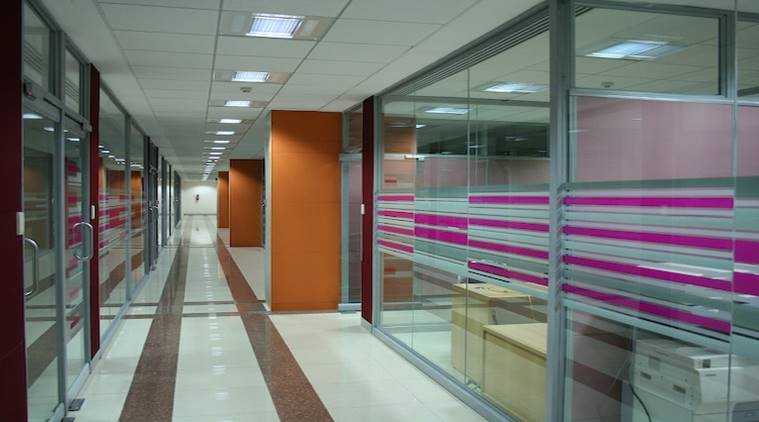- India
- International
Techtonic shift: Inside Mohali’s incubator, the largest in India
Angad Singh Brar finds out what makes the Mohali incubator unique.
 The Mohali incubator focusses on startups in the field of Information Technology and is a Centre of Excellence for Artificial Intelligence. (Photo courtesy: stpi.in)
The Mohali incubator focusses on startups in the field of Information Technology and is a Centre of Excellence for Artificial Intelligence. (Photo courtesy: stpi.in)
Mohali is home to the largest incubator in the country. Software Technology Parks of India’s (STPI) Mohali facility is constructed on 14,0000 sqft of land, making it the largest incubator in the country. It started functioning in 2017.
The Mohali incubator focusses on startups in the field of Information Technology and is a Centre of Excellence for Artificial Intelligence. There are 24 startups housed in the facility at present. All of these startups are doing innovative product development or R&D in different areas like drone technology, healthcare services, education and agriculture.
AgNext, one of the startups at STPI Mohali, has raised a total of around $4 million over the last year. Many other startups are at the final stages of receiving funding.
Dwelling on the facilities at the incubator, Ajay Prasad Shrivastava, Additional Director of STPI Mohali, said, “We provide plug-and-play seats at a very competitive price as compared to the market. Women entrepreneurs can get a seat for as low as ₹3894 per month. There are special discounts for SC/ST category entrepreneurs and Divyang innovators are also given discounts at this facility. The price point is very important as a newborn startup will always be cash strapped.”
Elaborating further, he said, “Providing startups with a space to sit and work is just a part of the incubation process. The real journey of the startup starts after it. There is a need for constant mentorship, funding and another day to day support. STPI Mohali ensures that resident startups face no issues in these areas. It is only when a startup fully concentrates on their product, it can expect a profitable result. We make sure that the startups get specific mentorship; for example, if a person with no knowledge of technology has an idea worth implementing then we ensure that he is provided with technical support to realise the idea. We also link the policies of the government to those who can benefit from these policies. ”

For the purpose of funding, a pain-point for startups, STPI Mohali also houses the Chandigarh Angel Network, a network of Angel investors. STPI Mohali has mostly remained at full occupancy level but it plans to expand soon. Shrivastava also added they do not give our facility to a freelancer but to a startup as they strongly believe in innovation.
The potential
Commenting on the scope for software-based industry, Dr Omkar Rai, the Director-General of STPI, told Newsline, “The market size of Indian software products industry in Fiscal Year 2019 is $8.2 billion, of which $5.5 billion is from the domestic market and $2.7 billion from exports. Although Indian software products industry just accounts for 1.6% of the global market, given the global opportunities in this segment, India can strive to capture the largest pie of the global software products market. The Indian IT industry, which clocked $177 billion in revenue in Fiscal Year 2019, is expected to reach $350 billion by 2025. It’s not far when many of the budding tech start-ups would transform themselves into tomorrow’s global unicorns, and not just in value, making India a superpower in innovation and entrepreneurship.”
A beneficiary speaks
XenonStack was awarded the startup of the year in the 2017 TiEcon, an L conference dedicated to encouraging entrepreneurship. XenonStack is housed in the STPI Mohali facility.
Providing an insight into the Mohali STPI, Navdeep Singh Gill, the founder of XenonStack, says, “STPI is not an institution to me. It is a community. I started from a small apartment and have been to various incubators like those at PEC and EDC (IT Park) but STPI stands apart. There is a strong security presence and the facility is not a thoroughfare. Cameras monitor every corner in the building. Entry is only for those authorised. Here I have 24 hours operations as my startup is into cloud-native transformation services, so I need a flawless electricity backup and security. I could not have found a better place.”
On being asked about other benefits of the facility, he said that “STPI Mohali is discussing an MoU with C-DAC Pune to bring a quantum computer to this facility. Such exposure is impossible at other incubators. Moreover, startups at STPI facilities all over India are going to Greece to showcase their products. The only cost we have to bear is the flight tickets. Rest everything has been done by STPI. This organisation is not monetarily driven. It is an organisation of technocrats which help everyone, be it a technology or a non-technically educated person, to build their startup.”
What is a startup?
Technology is generating wealth and innovation at an exponential pace but only a handful of places in the world are capturing most of that value creation. Startups are the key vehicle by which regions and their citizens can take advantage of technological change.
A startup or start-up is started by individual founders or entrepreneurs to search or validate a repeatable and scalable business model. Startups in India are under the Department of Industrial Policy & Promotion, Ministry of Commerce & Industry.
Startups rely on workable startup ecosystems consisting of three main things: people, startups and organisations. The people include those individuals who either work in a startup or have founded a startup. There are several types of organisations which also form a part of this ecosystem.
These organisations can be further divided into categories: universities, funding organisations, support organisations (like incubators, accelerators, co-working spaces etc.), research organisations, service provider organizations (like legal, financial services etc.) and large corporations.
Different organisations typically focus on specific parts of the ecosystem function and/or startups at their specific development stage. A startup ecosystem functions in a healthy manner only when there is continuous interaction among people, startups and organisations.
What is STPI?
Software Technology Parks of India (STPI) is an autonomous organisation under the Ministry of Electronics and Information Technology. It has 59 facilities all over India of which one is at Mohali which comes under the Noida jurisdiction of STPI. STPI was established by the government of India in wake of the 1991 liberalisation reforms.
The government had foreseen the potential of exports from Information Technology (IT) industry and hence set up STPI to monitor exports in IT sector from India. STPI, since its inception, has functioned as a facilitator of IT services and development.
One of its functions is to certify export remittances of IT exporting companies like Infosys. This role of STPI generates revenue for the self-financed organisation through “STPI charges” paid by IT companies. As time has progressed, there is a proliferation of startups in the IT sector.
But unfortunately, many of them fail for want of being economically viable. STPI facilitates new startups by helping them turn their ideas into workable business models. This is called incubation.
Punjab and the IT Sector
With STPI Mohali situated in Punjab and the state getting the maximum Gross State Value Addition from the services sector, it becomes important to understand the efforts being undertaken by Punjab to promote IT and startups.
Elaborating on these efforts, Rajat Agarwal, CEO of Invest Punjab, said, “The Punjab Industrial and Business Development Policy 2017 has given a fillip to startups by giving them a seed grant up to ₹ 3 lakh through State/Centre – recognised incubators. All incentives provided to MSME units in Punjab Industrial and Business Development Policy 2017 are also extended to Startups. There is also reimbursement of Lease Rental up to ₹3 lakh per annum for 1 year.”
Elaborating further, Agarwal said, “The IT industry is as important to Punjab as agriculture or conventional industry. There are very few states in India which mention startups in their industrial policy. The government is working towards nurturing and maturing startups with alacrity. We have incubation facilities like STPI Mohali, ISB Mohali, IIT Ropar, STEP Thapar University, Punjab Biotechnology Incubator, and Technology Business at IISER Mohali. ”
The Punjab government is providing a slew of incentives to incubators. Listing these, Agarwal said, “There is a Capital grant of 100% of Fixed Capital Investment up to 1 crore for Government incubators. For private incubators, the government is providing a Capital grant of 50% of Fixed Capital Investment up to ₹50 lakh.” He emphasised, “I believe that an ecosystem takes time to develop and even more time to get noticed. Punjab’s image shift will take time but the results of our efforts will be seen very soon. Business giants like Flipkart are already showing a keen interest in coming to Mohali.
Investment in the IT and ITeS sectors has increased by 200% in the fiscal year of 2018-2019. STPI Mohali has reported IT exports valued ₹4400 crores. All this shows the direction in which Punjab is headed.” Agarwal added “To me, the amount of capital investment being infused into Punjab is just a number. What I care about is jobs created on the ground and IT sector is and will be creating many more jobs in Punjab.
Talking on the importance of IT sector for Punjab, l Bikram Singh Majithia, ex-Revenue Minister of Punjab, said, “STPI needs a land grant from the state government to establish a facility. STPI Mohali was set up in 1998 when the Akali government was in power. Punjab is in dire need of industries in food processing and IT sector but I see no work on the ground. There are only talks and no shows.”
Apr 24: Latest News
- 01
- 02
- 03
- 04
- 05







































